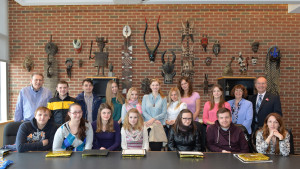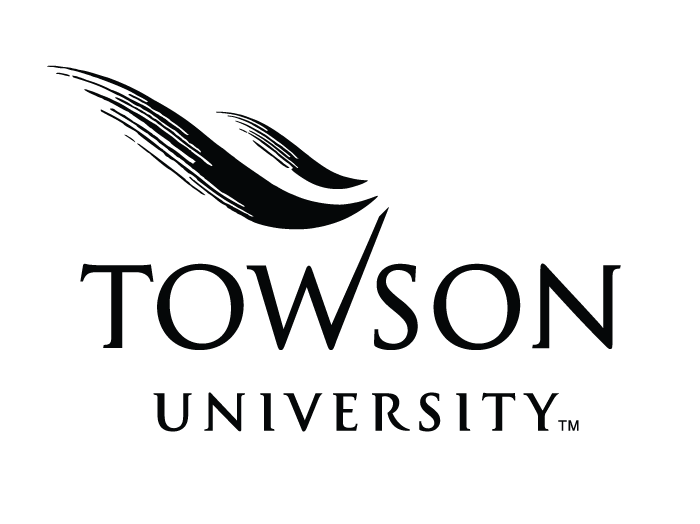
Russian public relations students with Garry Bolan (top left), Dean Susan Picinich and Professor Greg Faller (top right)
Seventeen public relations students from Russia’s St. Petersburg Electrotechical University are wrapping up their two-week visit to Towson University.
The students, who are all part of the College of Fine Arts and Communication’s twenty one-year-old St. Petersburg-Towson Exchange program, have been sharing and learning approaches to advertising, public relations and marketing. Mass Communication and Communication Studies Lecturer Garry Bolan is shepherding the Russian students during their visit.
“The visiting Russian students help our students better understand differences and similarities between the U.S. and another culture,” said Bolan. “What we may teach as advertising and public relations here is interpreted as simply public relations in Russia. While the Russian students frequently use VKontakte (Europe’s second-largest social network, behind Facebook) for group chats with other Russian students, our students focus more on Facebook and Instagram to post and read individual status updates.
“At the end of the day, though, our students come to understand that, even with different approaches, we are all quite similar in the goals that we pursue.”
As part of their visit, the students gave presentations to Towson University students as well as the Towson University Public Relations Student Group about the development and background of public relations, social media and successful advertising in Russia.
“[Historically] only the government had done PR,” said Maksim Danilov, who has visited Towson University twice on the exchange program. “Now, it is a very young profession in Russia with a different approach.”
In Russia, it takes five years to become a PR specialist with a combined concentration in advertising, marketing and PR. Most of the Russian students work full-time in addition to full-time study.
“[It’s] very difficult to find a job,” said Xenia Nechaeva. “It is better to find jobs while in university.”
Yet the Russian students say the American academic experience is much more difficult—but it’s helping them learn. “There’s a more clear understanding [of] how the different fields of communication work, unlike in Russia,” said Nechaeva. “We recognize how much we need to do in Russia in advertising, PR and social media.”
As part of the exchange program, the students worked with Imre, a communications firm in Sparks, Md., to develop and present a true-to-life case study.
“We are happy to be a part of the relationship with Towson University and St. Petersburg Electrotechnical University,” said Imre CEO Dave Imre. “We have hosted a group of their students annually…. Our staff at IMRE and our international clients have benefited from the relationship, gaining key insights on the Russian market.”
The students say they’re thrilled to have the opportunity to visit the United States. “The exchange enhances our professional experience,” said Juliia Cladneva.
Danilov said he loves the friendliness of the American culture—something he doesn’t see in Russia. “None of the students are homesick. The atmosphere is very nice, and we are very thankful.”
The students will depart the U.S. to return to Russia on Friday.
